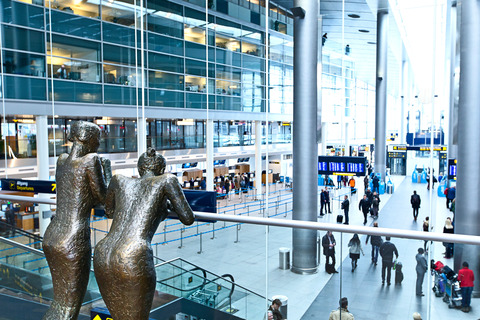News:
After losing almost DKK 1.5 billion over two years CPH turns a small profit in Q3
With 16 million travellers, 275 routes to choose from and a profit before tax of DKK 221 million for the first nine months of 2022, Copenhagen Airports is emerging from the worst crisis in recent memory.
“Despite renewed uncertainty fuelled by the energy crisis, war, inflation, and the risk of new COVID-19 variants, we expect a profit for the year in the DKK 125-225 million range. The aviation industry is emerging from the crisis despite several dark clouds looming on the horizon. Things are improving, but we are definitely not there yet,” says Thomas Woldbye, CEO of Copenhagen Airports.
CPH ended the third quarter of 2022 with a profit before tax of DKK 234 million, an improvement over the DKK 159 million profit for the second quarter and significantly better than the DKK 171 million loss reported for the first quarter.
“In the first two, extremely challenging, years of the pandemic, we accumulated a loss before tax just short of DKK 1.5 billion. Against that backdrop, our third-quarter performance and the DKK 221 million profit for the first nine months of 2022 is satisfactory,” says Thomas Woldbye.
Revenue for the third quarter landed at DKK 1,071 million, a 71% improvement on the same period of 2021. Total revenue for the nine-month period was DKK 2,621 million. This is still 21% below 2019, the last normal pre-pandemic year.
Terminals and runways teeming with activity
The terminals are once again busy as eight in ten travellers are back and new stores and restaurants have opened or reopened.
The route networks are also on the way to being restored. At the end of the third quarter, passengers were flown to and from 144 destinations, corresponding to index 89 compared with 2019. The passenger number is expected to reach 22 million by the end of 2022, compared with 30.3 million in 2019.
“Airlines have regained a good foothold here at CPH, and many destinations are served by more than one carrier. We currently count 275 routes to 144 destinations – which is in fact a few more than before the pandemic. Also, the aircrafts are flying at close to full capacity again, with eight in ten seats being sold,” says Thomas Woldbye.
When the pandemic hit in March 2020, Copenhagen Airports employed just under 2,700 people. After 800 redundancies and significant cost cuts, passengers began to return this year, and with them the need for more hands and heads. Today, the headcount at CPH is about 2,350.
“We managed the rapid increase in flights and passengers this past spring and summer reasonably well and have hired more than 500 new employees,” says Thomas Woldbye.
The growing desire to travel has created lots of new jobs and lots of activity throughout the airport. From the low point in September 2021, the number of employees at the nearly 1,000 businesses operating in and around the airport has grown by 3,300 from 12,800 to about 16,100 today.
“The airport is the base of one of Denmark’s largest financial ecosystems, and its value creation goes far beyond our own organisation. It is important for the Danish economy that the business is back up to speed. More than 3,300 jobs have been created in and around the airport in the past year,” explains Thomas Woldbye.
The debt has to be repaid
In the first two years of the crisis, CPH borrowed a total of DKK 2.2 billion to keep the airports running and to make the necessary investments.
“We have to repay this debt and at the same time we need to be able to invest in the sustainable airport of the future and retain our position as an important northern European air traffic hub. That is a very big challenge,” says Thomas Woldbye.
He emphasises that Copenhagen Airport must continue to have competitive prices.
“It is difficult to see how we can avoid becoming more expensive, if we are to be able to invest and repay the debt” says Thomas Woldbye.
Investments for the future
Investments for the year are expected to be in the region of approximately DKK 950-1,000 million.
“We still have ambitions to invest in the airport in the coming years, however, that will depend on our ability to do so. Regardless of the crisis, we have so far been able to continue our ambitious project to extend the airside terminal area, for example to create extra space for the baggage reclaim area, airport travellers and passport control,” says Thomas Woldbye.
The future of the project depends on sufficient compensation for costs and investments in connection with the aeronautical infrastructure.
